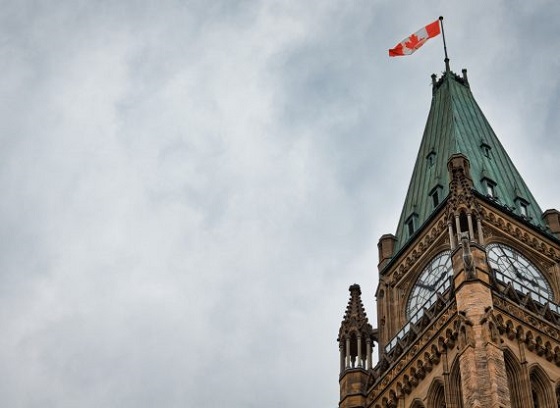David Clinton
How would provinces and cities survive if the federal government collapsed?


How Resilient Are Canadian Provinces?
Suppose one fine day the federal government was unable to show up for work. Perhaps it wasn’t feeling well. Or maybe it had borrowed so much money that it maxed out its line of credit, defaulted on its interest payments, and just couldn’t pay its bills. What then?
Let’s say – and I’m just spitballing here – let’s say that exploding, uncontrolled public debt is a bad thing. All the smart people tell us that taking on too much credit card debt won’t end well, right? Well I can’t think of any solid reason that such logic shouldn’t also apply to governments.¹
The Audit is a reader-supported publication. To receive new posts and support my work, consider becoming a free or paid subscriber.
As you can see from the graph, our federal public debt climbed from $351 billion in 1990 all the way to $884 billion in 2024. The 50 percent leap between Q4 2019 and Q4 2021 was the generous gift of COVID. Things started to recover in mid-2023, but they’ve since nose dived once again.
Ah, but that’s just debt you say. It’s someone else’s problem.
Not exactly. You see, even if we’re not paying down the principle on the debt, you can be sure that we’re covering interest payments. Which, it just so happens, have become a lot more expensive ever since massive government borrowing drove up interest rates.
How much more expensive? As of Q1 2024, our annual interest payments totaled $11.7 billion, compared with $6.2 billion back in Q1 2022. Put differently, the interest we pay each year comes to seven percent of our total federal budget.
I’m certainly not going to confidently predict that the federal government will soon default on interest payments, lose access to capital markets, and begin laying off government workers and shutting down services. But I wouldn’t say that it can’t happen either.
Given that possibility, what can provinces and cities do right now to prepare for a sudden (hopefully brief) disruption? First off, though, what exactly is a province?
As defined by the British North America Acts, areas of the exclusive responsibility of the federal government include:
- Public debt and property
- Regulation of trade and commerce
- Criminal law
- Militia, military and naval service, and defense
- Navigation and shipping
- Banking, incorporation of banks, and the issue of paper money
- Bankruptcy and insolvency
- Naturalization and aliens
- Unemployment insurance
Provinces are responsible for:
- Property and civil rights
- Administration of justice (including policing)
- Municipal institutions
- Education
- Health and welfare
- Natural resources
So a short-term federal disruption might not have much of an impact on most Canadians’ day-to-day activities. Federal employees and UI recipients would have to figure out how to survive without their paychecks and border entry points would shut down. But great news! Your criminal prosecution can go ahead on schedule because, while criminal law is controlled by the feds, lower criminal courts are provincial.
On the other hand, consider how federal transfers contribute between around 15 percent (Alberta) and 40 percent (Atlantic provinces) of provincial budgets. And Toronto’s municipal budget, for instance, includes around 15 percent in transfers from the province, and another five percent from the federal government. So it wouldn’t take long before all levels of government begin to feel the heat.
I’m not suggesting we change Canadian federalism (good luck trying). But a province that’s reduced or eliminated its own budget deficit and successfully weaned itself from incoming federal transfers would probably enjoy a smoother trip through a shutdown. Exploring the legality of temporarily taking over the payroll for critical federal roles (like Border Services), for instance, might also pay dividends when push came to shove.
I would suggest that thinking formally about these issues would be an important part of any government’s emergency planning preparedness. Yesterday was the best time to start. But today is the next best option.
The Audit is a reader-supported publication. To receive new posts and support my work, consider becoming a free or paid subscriber.
Post-COVID, the claims of Modern Monetary Theory proponents didn’t age well.
Invite your friends and earn rewards
Artificial Intelligence
When A.I. Investments Make (No) Sense

Based mostly on their 2024 budget, the federal government has promised $2.4 billion in support of artificial intelligence (A.I.) innovation and research. Given the potential importance of the A.I. sector and the universal expectation that modern governments should support private business development, this doesn’t sound all that crazy.
But does this particular implementation of that role actually make sense? After all, the global A.I. industry is currently suffering existential convulsions, with hundreds of billions of dollars worth of sector dominance regularly shifting back and forth between the big corporate players. And I’m not sure any major provider has yet built a demonstrably profitable model. Is Canada in a realistic position to compete on this playing field and, if we are, should we really want to?
First of all, it’s worth examining the planned spending itself.
- $2 billion over five years was committed to the Canadian Sovereign A.I. Compute Strategy, which targets public and private infrastructure for increasing A.I. compute capacity, including public supercomputing facilities.
- $200 million has been earmarked for the Regional Artificial Intelligence Initiative (RAII) via Regional Development Agencies intended to boost A.I. startups.
- $100 million to boost productivity is going to the National Research Council Canada’s A.I. Assist Program
- The Canadian A.I. Safety Institute will receive $50 million
In their goals, the $300 million going to those RAII and NRC programs don’t seem substantially different from existing industry support programs like SR&ED. So there’s really nothing much to say about them.
And I wish the poor folk at the Canadian A.I. Safety Institute the best of luck. Their goals might (or might not) be laudable, but I personally don’t see any chance they’ll be successful. Once A.I. models come on line, it’s only a matter of time before users will figure out how to make them do whatever they want.
But I’m really interested in that $2 billion for infrastructure and compute capacity. The first red flag here has to be our access to sufficient power generation.
Canada currently generates more electrical power than we need, but that’s changing fast. To increase capacity to meet government EV mandates, decarbonization goals, and population growth could require doubling our capacity. And that’s before we try to bring A.I. super computers online. Just for context, Amazon, Microsoft, Google, and Oracle all have plans to build their own nuclear reactors to power their data centers. These things require an enormous amount of power.
I’m not sure I see a path to success here. Plowing money into A.I. compute infrastructure while promoting zero emissions policies that’ll ensure your infrastructure can never be powered isn’t smart.
However, the larger problem here may be the current state of the A.I. industry itself. All the frantic scrambling we’re seeing among investors and governments desperate to buy into the current gold rush is mostly focused on the astronomical investment returns that are possible.
There’s nothing wrong with that in principle. But “astronomical investment returns” are also possible by betting on extreme long shots at the race track or shorting equity positions in the Big Five Canadian banks. Not every “possible” investment is appropriate for government policymakers.
Right now the big players (OpenAI, Anthropic, etc.) are struggling to turn a profit. Sure, they regularly manage to build new models that drop the cost of an inference token by ten times. But those new models consume ten or a hundred times more tokens responding to each request. And flat-rate monthly customers regularly increase the volume and complexity of their requests. At this point, there’s apparently no easy way out of this trap.
Since business customers and power users – the most profitable parts of the market – insist on using only the newest and most powerful models while resisting pay-as-you-go contracts, profit margins aren’t scaling. Reportedly, OpenAI is betting on commoditizing its chat services and making its money from advertising. But it’s also working to drive Anthropic and the others out of business by competing head-to-head for the enterprise API business with low prices.
In other words, this is a highly volatile and competitive industry where it’s nearly impossible to visualize what success might even look like with confidence.
Is A.I. potentially world-changing? Yes it is. Could building A.I. compute infrastructure make some investors wildly wealthy? Yes it could. But is it the kind of gamble that’s suitable for public funds?
Perhaps not.
Business
Is Canada’s $100B+ Climate Plan Based on Shaky Science?

Rising CO2 levels have, in fact, been instrumental in promoting an ongoing planet-wide increase in vegetation cover. This is thanks to enhanced photosynthesis and water use efficiency and has contributed to higher agricultural yields. It turns out that, whatever acidification may be happening, there appears to be no serious impact on marine life.
The Climate Working Group at the U.S. Department of Energy recently published “A Critical Review of Impacts of Greenhouse Gas Emissions on the U.S. Climate“. Of note, that group includes University of Guelph’s very own Professor Ross McKitrick.
The authors conclude that while climate change is real and influenced by human emissions, its risks are often exaggerated. Instead:
- Published models have consistently and aggressively overestimated warming
- Extreme weather trends are not worsening as claimed
- Aggressive mitigation policies may cause more harm than good
Rising CO2 levels have, in fact, been instrumental in promoting an ongoing planet-wide increase in vegetation cover. This is thanks to enhanced photosynthesis and water use efficiency and has contributed to higher agricultural yields. It turns out that, whatever acidification may be happening, there appears to be no serious impact on marine life.
To be sure, there’s been vocal push back against the report’s findings. But that just highlights the complexity, volatility, and intense political stakes of the issues involved.
Despite my own stellar academic publishing history (see my high school paper from 45 years ago on CO2 emissions and the acidification of lakes in Ontario for full details), it turns out that I’m not qualified to express an opinion here. After all, I lack the necessary combined expertise in natural sciences, applied sciences, social sciences, and so on.
But I suspect that the people in Ottawa who make related policy decisions aren’t necessarily all that better prepared than I am. Which makes me wonder just how much of our money has been spent through the past ten years based on assumptions that are far from universally accepted in the scientific community.
The short answer is: many billions of dollars. Here are some highlights:
- $28.7 billion for the public transit envelope from the Investing in Canada Plan
- $26.9 billion for the Green Infrastructure Investments envelope from the Investing in Canada Plan
- $2 billion for the Low Carbon Economy Fund
- $8 billion for the Net Zero Accelerator
- $103 billion for the Clean-economy Investment Tax Credits (although that won’t all be spent before 2035)
- $3 billion in EV purchase rebates from the Incentives for Zero-Emission Vehicles
- $2.6 billion for Canada Greener Homes Grants
- $2.75 billion for the Zero-Emission Transit Fund (school buses and municipal ZEV fleets)
- $1.5 billion to support low-carbon fuel production and adoption
- $964 million for the Smart Renewables and Electrification Pathways Program (renewable projects, storage, and grid modernization)
- $680 million for Zero-Emission Vehicle Infrastructure Program (charging stations and hydrogen refuelling)
Granted, some of that funding will address other policy needs besides just climate change mitigation, and nearly all of it is designed to be paid out over multiple years. And of course, not all funds that were allocated have been spent yet. Two thumbs up for inertia!
But it’s still an awful lot of money considering no one really knows for sure whether any of this is helpful. Not to mention that, while it’s complicated, after a decade of trying, Canada’s actual emissions haven’t necessarily dropped.
-

 Agriculture2 days ago
Agriculture2 days agoDanish Cows Collapsing Under Mandatory Methane-Reducing Additive
-

 Alberta2 days ago
Alberta2 days agoAlberta government’s plan will improve access to MRIs and CT scans
-

 Business2 days ago
Business2 days agoNo Jobs Clause: Liberals Under Fire Over Stellantis Deal in Fiery Committee Showdown
-

 Economy2 days ago
Economy2 days agoWelcome to the Energy Humanist Club! Bill Gates breaks the moral monopoly against fossil fuels
-

 Business1 day ago
Business1 day agoBudget 2025 continues to balloon spending and debt
-

 Censorship Industrial Complex1 day ago
Censorship Industrial Complex1 day agoHow the UK and Canada Are Leading the West’s Descent into Digital Authoritarianism
-

 Business1 day ago
Business1 day agoFederal budget: Carney government posts largest deficit in Canadian history outside pandemic
-

 Business1 day ago
Business1 day agoCapital Flight Signals No Confidence In Carney’s Agenda











